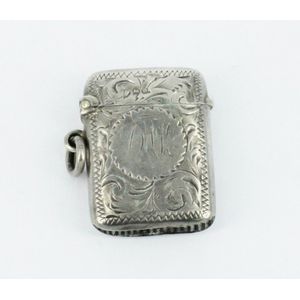Victorian Sterling Silver Vesta Cases (Set of 2)
Two Victorian sterling silver vesta cases, English and Scottish, 1880 Birmingham, with maker's mark for Joseph Hayes Taylor, a small engraved vesta with bright cut borders, and 1889 Edinburgh, with maker's mark for George Edward & Sons (usually associated with Glasgow), but marked to the other side, Ge, with embossed rococo decoration upon a textured ground to one face and wavy flutes to the reverse, hallmarked to both, silver weight 30gr
You must be a subscriber, and be logged in to view price and dealer details.
Subscribe Now to view actual auction price for this item
When you subscribe, you have the option of setting the currency in which to display prices to $Au, $US, $NZ or Stg.
This item has been sold, and the description, image and price are for reference purposes only.
- Victorian Period - The Victorian period of furniture and decorative arts design covers the reign of Queen Victoria from 1837 to 1901. There was not one dominant style of furniture in the Victorian period. Designers used and modified many historical styles such as Gothic, Tudor, Elizabethan, English Rococo, Neoclassical and others, although use of some styles, such as English Rococo and Gothic tended to dominate the furniture manufacture of the period.
The Victorian period was preceded by the Regency and William IV periods, and followed by the Edwardian period, named for Edward VII (1841 ? 1910) who was King of the United Kingdom and the British Dominions and Emperor of India for the brief period from 1901 until his death in 1910. - Sterling Silver - Sterling silver is a mixture of 92.5% pure silver and 7.5% of another metal, usually copper. Fine silver is 99.9% pure silver, and is relatively soft and the addition of the very small amount of copper gives the metal enough strength and hardness to be worked into jewellery, decorative and household objects.
- Embossed / Repousse - Embossing, also known as repousse, is the technique of decorating metal with raised designs, by pressing or beating out the design from the reverse side of the object.It is the opposite of chasing, where the decoration is applied from the front. An embossed or repoussed object may have chasing applied to finish off the design.
This item has been included into following indexes:
Visually similar items

Sterling silver vesta & locket
Sold by
in
for
You can display prices in $Au, $US, $NZ or Stg.

A silver vesta case by William Neale & Son, Sheffield, 1897. Weight:
Sold by
in
for
You can display prices in $Au, $US, $NZ or Stg.

Figurative German silver vesta box, embossed 'Village Scene', plated interior slide, late 19th century. 925 silver.
Sold by
in
for
You can display prices in $Au, $US, $NZ or Stg.

An Edward VII silver vesta case, foliate engraved and monogrammed, contains original matches, makers mark obscured, Chester, 1904.
Sold by
in
for
You can display prices in $Au, $US, $NZ or Stg.
